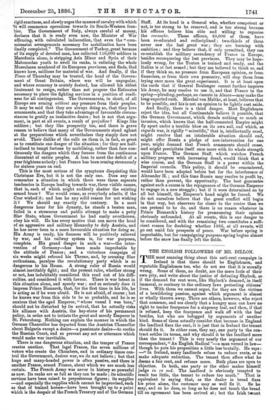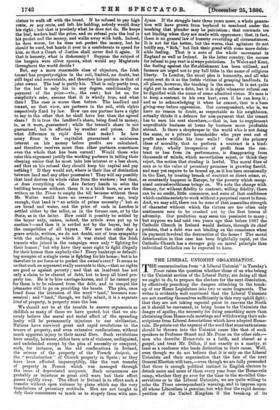THE ENGLISH FOLLOWERS OF MR. DILLON.
THE most amazing thing about this anti-rent campaign in Ireland is that there should be Englishmen, and reputable Englishmen too, who do not see that it is morally wrong. Some of them, no doubt, are the mere fools of their own pity, and write about the justice of defeating Shylock, as if the demand for rent were, like Shylock's demand, in itself immoral, or contrary to the ordinary laws protecting citizens' lives. With them we cannot argue, for they are the victims of a bewildering passion, against which argument is almost or wholly thrown away. There are others, however, who reject that nonsense, and see clearly that a hungry man can have no right to tender fourpence for a sixpenny loaf, and then, if that is refused, keep the fourpence and walk off with the loaf besides, but who are befogged by arguments of another kind. Some of them actually consider that because in England the landlord fixes the rent, it is just that in Ireland the tenant should fix it. In either case, they say, one party to the con- tract settles its terms, and why should it be the landlord more than the tenant ? This is very nearly the argument of our correspondent, "An English Radical "—a man versed in law— though he puts his proposition a little less brutally. He says : —"In Ireland, many landlords refuse to reduce rents, or to make adequate reduction. The tenant then offers what he deems a fair rent, and refuses more. Both plans are open to objection. In both, one party or the other makes himself judge in re sua. The landlord is obviously tempted to remit too little, the tenant to reduce too much." That is equivalent to saying that, as the dealer in bread fixes
his price alone, the customer may as well fix it. So he may, and so he does, so long as he does not touch the bread till an agreement has been arrived at ; but the Irish tenant claims to walk off with the bread. If he refused to pay high rents, or any rents, and left his holding, nobody would deny his right ; but that is precisely what he does not do. He keeps the loaf, tenders half the price, and on refusal puts the loaf in his pocket and the money, and walks away with both. Indeed, he does worse, for he does not pocket the money, lest he should be sued, but hands it over to a confederate to spend for him, so that a Court of Justice shall never find it again. If that is honesty, what is dishonesty ? Suppose the subject of the bargain were silver spoons, what would any Magistrate throughout the world decide ?
But, say a more reasonable class of objectors, the Irish tenant has property-rights in the soil, limited, no doubt, bat still legal and recoverable, and therefore his position is that of joint owner. The loaf is partly Ms. That is only partly true, for the loaf is only his in any degree, conditionally on payment of the price—viz., the rent ; but let us, for simplicity's sake, assume that it is wholly true, and what then? The case is worse than before. The landlord and tenant, on that view, are partners in the soil, with rights respectively fixed by law. How can one partner have a right to ray to the other that he shall have less than the agreed share It is true the landlord's share, being fixed in money, is, as it were, guaranteed ; while the tenant's share is not guaranteed, but is affected by weather and prices. But what difference in right does that make In how many firms is the capitalist guaranteed a minimum interest on his money before profits are calculated, and therefore receives more than other partners, sometimes even the whole that has been earned I Would those who raise this argument justify the 'working partners in telling their sleeping senior that he must take less interest or a less share, and that on his refusal they should keep his capital and pay nothing? If they would not, where is their line of distinction between land and any other possession? They will say possibly that land derives its whole value from the workers ; but then, se does everything else. Are factory hands to seize the building because without them it is a brick barn, or are the writers on the Times to empty the till because without them Mr. Walter would have no revenue Some say, truly enough, that land is "an article of prime necessity ;" but so are bread and water, and the price of each in London is settled either by the seller, as in the former case, or by the State, as in the latter. How could it possibly be settled by the buyer only, unless, indeed, the article were put up to auction ?—and then it is settled not by the buyer, but by -the competition of all buyers. We saw the other day a grave article, written, we do not doubt, out of true sympathy with the suffering, in which it was stated that the Irish tenants who joined in the campaign were only" fighting for their homes ;" but why have they more right to fight illegally for their homes than anybody else ? Every bankrupt or default- ing occupier of a single room is fighting for his home ; but is he therefore to use force or to pocket the owner's rent? It seems to us that such an argument really amounts to this,—that no rights are good as against poverty ; and that an insolvent has not only a claim to be cleared of debt, but to keep all hired pro- perty too. He is to hire carriage-horses, and if he cannot pay for them is to be released from the debt, and to compel the jobmaster still to go on providing the beasts. The plea, once freed from the intrusion of the word "land," becomes non- sensical; and "land," though, we fully admit, it is a separate kind of property, is property none the less.
We should not be at the trouble to answer arguments so childish as many of those we have quoted, but that we sin- cerely believe the moral and social effect of the spreading laxity will be permanently injurious to our civilisation. liations have survived great and rapid revolutions in the tenure of property, and even extensive confiscations, without much apparent injury to their moral fibre. Such revolutions have usually, however, either been acts of violence, undisguised, and undefended except by the plea of necessity or conquest, such, for instance, as the old confiscations in Ireland, the seizure of the property of the French emigre's, or the " secularisation " of Church property in Spain ; or they have been effected imperceptibly, Ile the vast transfer of property in France which was managed through' the issue of depreciated assignats. Such occurrences are probably as injurious as great civil wars, but their effect passes rapidly away. The effort in Ireland is to effect such a transfer without open violence by plans which sap the very foundations of pecuniary rectitude. Men are not taught to defy their consciences se much as to stupefy them with ano- dynes. If the struggle lasts three years more, a whole genera- tion will have grown from boyhood to manhood under the teaching that plunder may be patriotism ; that contracts are not binding when they are made with oppressors ; that, in fact, there is no general law of honesty overriding all circumstances. It is not for the better, but the worse, that agitators do not boldly say, "Rob," but link their greed with some more defen- sible feeling. That is a note of the whole movement in England as well as Ireland. In the latter country, the excuse for refusal to pay rent is always patriotism. In Wales and Kent, the feeling against the Establishment has been utilised, and farmers are urged not to pay full tithe in the name of religious liberty. In London, the usual plea is humanity, and all who resist rent do it as the feeble victims of grasping landlords. In all places, however, the teaching is the same. It is not quite right yet to refuse a debt, but it is right whenever refusal can be dignified with the name of some admitted virtue. No man is ' to keep a contract to his own hurt, even if he can keep it ; and as to acknowledging it when he cannot, that is a base giving-way before oppression. Our correspondent, who is, we have no reason to doubt, as respectable as his neighbours, actually thinks it a defence for non-payment that the tenant has to earn his rent elsewhere,—that is, has to supplement unprofitable business at home by business more profitable abroad. Is there a shopkeeper in the world who is not doing the same, or a private householder who pays rent out of profit made within his four walls? One of the primary ideas of morality, that to perform a contract is a bind- ing duty, wholly irrespective of profit from the con- tract or loss from its performance, is disappearing from thousands of minds, which nevertheless reject, or think they reject, the notion that stealing is lawful. The moral fibre of men as to the value of pecuniary promises is growing flaccid, and may yet require to be braced up, as it has been occasionally in the East, by treating breach of contract as direct crime, or, as constantly happens in Europe, by the poverty which recog- nised untrustworthiness brings on. We note the change with dismay, for without fidelity to contract, willing fidelity, there can be no credit, little commerce, and none of that confidence which enables society to work without a perpetual resort to force. And, we may add, there can be none of that masculine strength of character without which the virtues are too often only sentiments sure to be crushed out by the first breeze of adversity. Our prediction may seem too pessimist to many ; but suppose we had said two years ago that before 1887 the Catholic Church in Ireland would declare, through its chief prelates, that a debt was not binding on the conscience when its payment involved the destruction of the home ? The moral deterioration in that case has been frightfully rapid, yet the Catholic Church has a stronger grip on moral principle than individual Catholics can be expected to have.



































 Previous page
Previous page